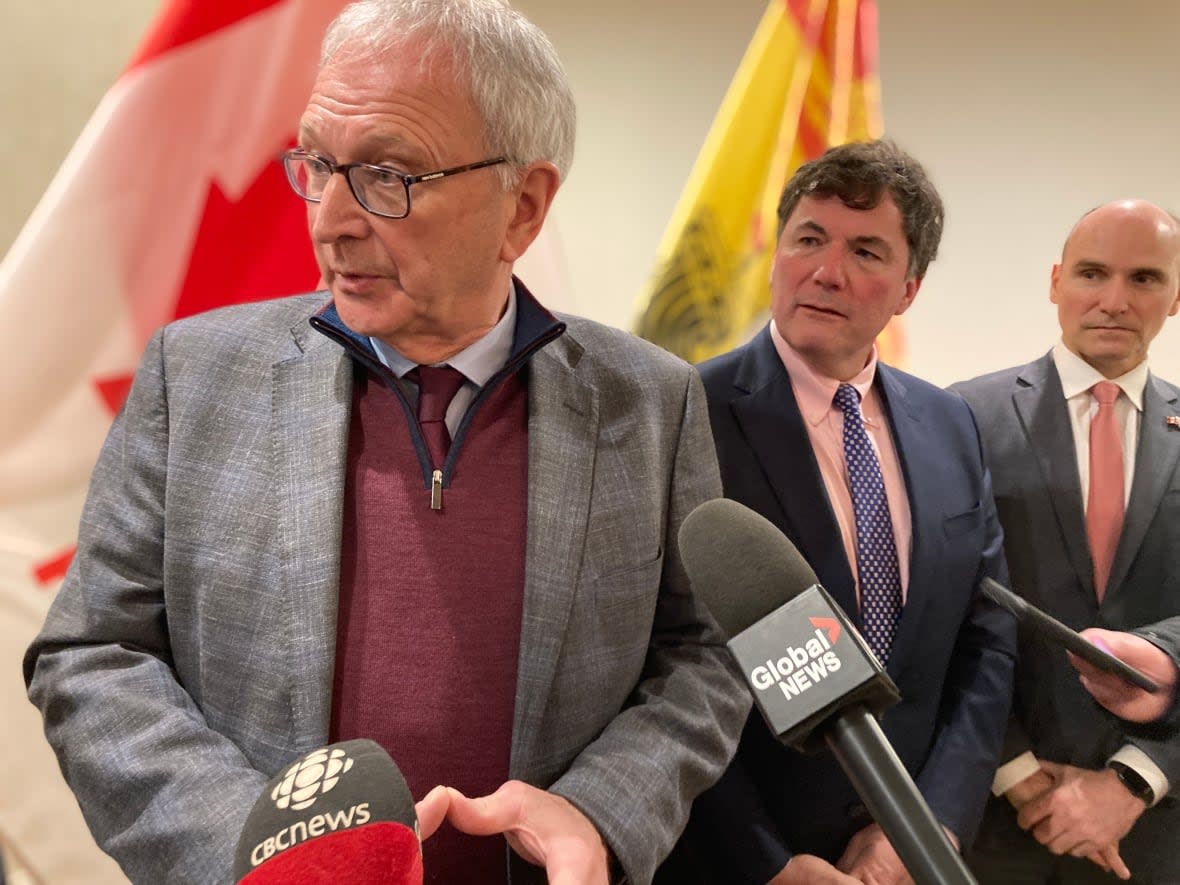Ottawa, N.B. say bilateral health deal will be ready in time for March budget

The federal and New Brunswick governments expect to clinch a bilateral deal on additional health-care funding in time for the money to be included in next month's provincial budget.
Federal Intergovernmental Affairs Minister Dominic LeBlanc and Health Minister Jean-Yves Duclos met with Premier Blaine Higgs Wednesday in Saint John, and all three politicians said afterward they are aligned on the funding.
"I think we're close to coming to an agreement in principle, which would allow New Brunswick to plan how they'd use these incremental federal dollars," LeBlanc said.
Higgs said the money will start flowing in July but the province will be able to account for it in the 2023-24 budget to be tabled March 21.

"We'll recognize that in our budget — what this money would fund — and we'll have agreements in place that would say exactly where it's going to go and what it's going to be used for."
The money in question is separate from the additional cash New Brunswick will receive from an increase to the Canada Health Transfer that Ottawa offered the provinces earlier this month.
Higgs pegged that amount at $200 million.
The discussions Wednesday focused on the federal offer of one-on-one agreements with individual provinces, tailored to their needs but still required to fall under four categories: family health services, wait times, mental health and addiction and modernizing the system.
The bilateral agreement alone will be worth $900 million to New Brunswick over 10 years.
That includes a base amount of $50 million that each province will get each year regardless of what they're entitled to under a per capita formula.
Higgs pointed to a recently opened private cataract surgery clinic in Bathurst as an example of health-care innovation that could be expanded thanks to the federal funding.
The clinic is privately owned, but Medicare pays for the procedures done there.
It has reduced the wait time for cataract surgery by 70 per cent in the area, the premier said.
"We'll do that in other parts of the province and we'll get rid of that wait list," he said.
Doesn't violate Health Act: federal minister
A bill passed by the legislature in December would allow more surgeries normally done in hospitals to be performed in private clinics, paid for with public funds.
Public-sector unions, the federal NDP and the provincial Greens have objected to private clinics and to the federal government sending more money to provinces allowing them.
But Duclos suggested Wednesday he does not believe New Brunswick's move violates the Canada Health Act.
The key principle of the act "is that people are looked after not based on their wallet, but based on their health-care needs," he said.
"That's a principle that is thankfully recognized and understood by everyone, and certainly here in New Brunswick," he said.
"If that were not the case, my responsibility as federal health minister would be to ensure that it changed, or that there were consequences if it did not."
'Constructive partner'
The bilateral funding agreement will run for 10 years.
LeBlanc and Duclos said they weren't concerned that New Brunswick is projecting a huge surplus this year, $862 million, that it refuses to spend while seeking more federal funding for next year.
"We haven't found any jurisdiction that believes or says that they can reduce their own level of spending" thanks to the federal dollars, LeBlanc said.
The federal minister praised Higgs as a "very constructive partner" in health-care negotiations, pointing out he was one of the first premiers to embrace data sharing as a way of measuring whether the new funding was having an effect.
Other premiers were initially reluctant to agree to that but Higgs "has publicly and privately been an ally to our government in these conversations," LeBlanc said.


